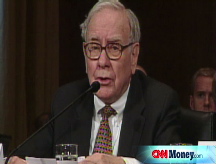McCain, Obama: We'll vote for plan
Presidential candidates say they can support proposed deal if their suggestions are part of it.
WASHINGTON (CNN) -- Sen. Barack Obama and Sen. John McCain said Sunday they would probably vote for the government's proposed bailout legislation once they check out the final details.
Congressional lawmakers announced early Sunday they made "great progress" toward reaching a deal on the White House's proposed $700 billion bailout plan.
Rep. Barney Frank, D-Mass., said the final plan will be a compromise that includes some of the original Bush administration proposals and elements demanded by Congressional negotiators.
In an interview Sunday on CBS' "Face the Nation," Obama said he had not reviewed the language of the latest proposal, but that if the core principles he put forth were incorporated into it, his "inclination" would be to vote for it.
The Illinois senator said the final deal must include strong oversight, make sure taxpayers share in any gains when the market recovers, provide relief for homeowners, and make sure taxpayers' money does not go toward any executives' bonuses.
Obama told CBS that it appears those principles have been included, and if that is the case, "my inclination would be to vote for it, understanding I'm not happy about it. We should have never gotten into this place in the first place."
"Ultimately, I believe that we have to get something done," he said. "And so if I feel that those are meaningful provisions that provide some constraints on how the Treasury operates, and this is not going to to be welfare for Wall Street, then my inclination is to vote for it because I think Main Street is now at stake."
The Democratic presidential candidate said he agreed with President Bush that the country is facing the most serious economic crisis since the Great Depression.
Asked whether McCain should get any credit for jump-starting negotiations, Obama said no.
"For two weeks, I was on the phone every day with (Treasury) Secretary (Henry) Paulson and the congressional leaders making sure that the principles that have ultimately been adopted were incorporated in the bill," Obama said.
McCain suspended his presidential campaign Wednesday to focus on the financial crisis and said he would not show up at Friday's presidential debate if Congress had not reached a deal. The Arizona senator said Friday morning that enough progress had been made for him to attend the debate.
In an interview Sunday on ABC's "This Week with George Stephanopoulos," McCain defended his decision to suspend his campaign, but said he did not deserve credit for bringing reluctant Republicans to agreement.
"It wasn't because of me that the House of -- Republicans in the House of Representatives got into the negotiating and bargaining, which was vital. It had to be bipartisan and bicameral. But they did it themselves. And I'm proud of the work that they did," he said.
Asked what role he did play, McCain said, "I will let you and others make -- be the judge of that. I did the best that I could. I came back because I wasn't going to phone it in."
McCain said he had not seen the details of the bailout proposal, but he would "hopefully" be able to support it.
"The outlines that I have read of it, that this is something that all of us will swallow hard and go forward with. The option of doing nothing is simply not an acceptable option," he said.
The Republican from Arizona said the principles he laid out had been met: protecting taxpayers, avoiding excessive compensation for CEOs, having an oversight body and not putting all of the responsibility in Paulson's hands.
The Republican presidential candidate said it is now time to put the deal into action.
"Let's get this deal done, signed by the president, and get moving, because the real effect of this is going to restore some confidence, and get some credit out there, and get the economic system moving again, which is basically in gridlock today.
"Let's look at this particular proposal. Let's get it through the Congress and the Senate and then sit down and see what else needs to be done before we say, 'We've got to do this, this, and this, as well,' " McCain said. ![]()


